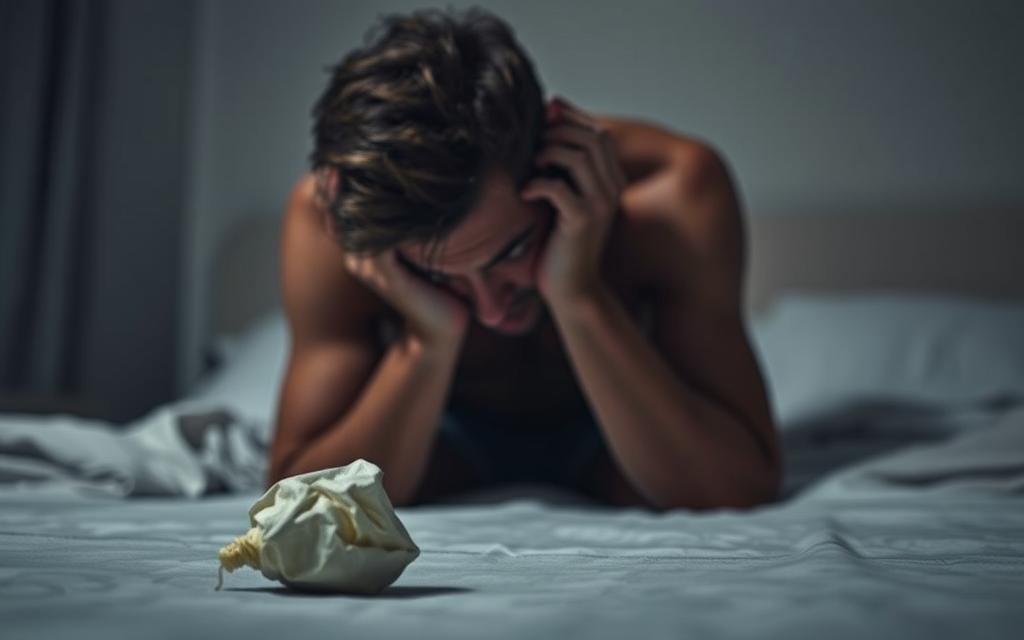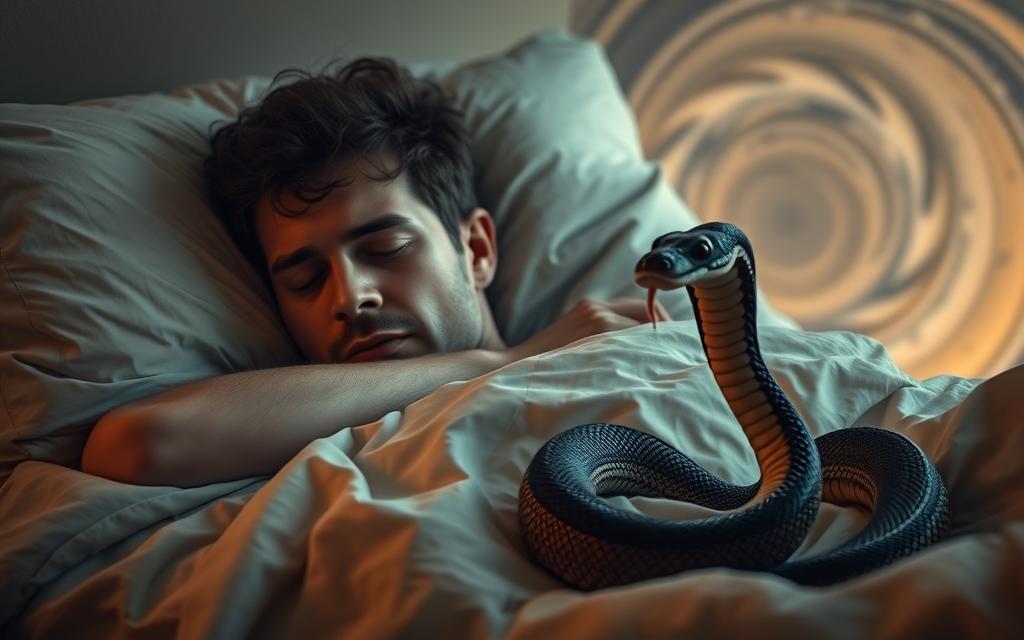Tired and Struggling? Sleep Deprivation and ED Explained
Are you tired of feeling exhausted and struggling with intimacy? Sleep deprivation can have a significant impact on your overall health, including your sexual well-being.
When we don’t get enough rest, our bodies produce less testosterone, a hormone essential for a healthy libido. This can lead to erectile dysfunction, a condition that affects millions of men worldwide.
The connection between sleep and sexual health is complex, involving a delicate balance of hormones, stress levels, and overall physical condition. Understanding this link is crucial for addressing the root causes of erectile dysfunction.
By exploring the relationship between sleep deprivation and erectile dysfunction, we can uncover effective solutions to improve your overall health and intimacy.
The Hidden Connection Between Sleep and Sexual Health
The intricate relationship between sleep and sexual health is often overlooked, yet it plays a crucial role in overall well-being. Sleep is a fundamental aspect of health that affects various bodily functions, including sexual function. Understanding this connection is vital for addressing related health issues.
How Your Body Recovers During Sleep
During sleep, the body undergoes various recovery processes. Sleep recovery is essential for physical health, including the repair and regeneration of tissues, building bone and muscle, and strengthening the immune system. Adequate sleep also impacts sexual health by ensuring that the body’s physiological needs are met, which in turn can improve sexual function.
The Role of Sleep in Hormone Regulation
Sleep plays a critical role in hormone regulation, which is closely linked to sexual health. Hormones such as testosterone, which is crucial for sexual function in both men and women, are regulated during sleep. Disruptions in sleep patterns can lead to hormonal imbalances, potentially affecting sexual health.
| Hormone | Function | Impact of Sleep |
|---|---|---|
| Testosterone | Crucial for sexual function | Regulated during sleep |
| Cortisol | Stress response | Affected by sleep quality |
| Growth Hormone | Tissue repair and growth | Secreted during deep sleep |
What Constitutes Healthy Sleep vs. Sleep Deprivation
Understanding the difference between healthy sleep and sleep deprivation is crucial for maintaining overall well-being. Healthy sleep is essential for physical and mental restoration, while sleep deprivation can lead to a myriad of health issues.
Sleep Cycles and Their Importance
Sleep cycles are crucial for restorative sleep. A full sleep cycle typically lasts around 90 minutes and includes stages of light and deep sleep, as well as REM sleep. REM sleep is particularly important for mental health, as it allows for the processing and consolidation of memories.
Signs You’re Not Getting Enough Quality Sleep
Signs of inadequate sleep include persistent fatigue, difficulty concentrating, and irritability. Additionally, waking up with headaches or muscle pain can be indicators of poor sleep quality. It’s essential to identify these signs to address sleep issues promptly.
How Many Americans Suffer from Sleep Deprivation
Sleep deprivation is a widespread issue in the United States, affecting millions of Americans. According to recent studies, a significant portion of the population does not get the recommended amount of sleep, leading to various health problems and decreased productivity.
By understanding the importance of sleep cycles and recognizing the signs of sleep deprivation, individuals can take steps to improve their sleep quality and overall health.
Understanding Erectile Dysfunction: Causes and Prevalence
Understanding erectile dysfunction requires a comprehensive look at its definition, symptoms, and the myriad causes that can lead to this condition. Erectile dysfunction (ED) is a significant health issue affecting a substantial number of men.
Defining ED and Its Symptoms
Erectile dysfunction is characterized by the inability to achieve or maintain an erection sufficient for satisfactory sexual performance. Symptoms of ED can vary, including difficulty achieving an erection, inability to maintain an erection, or reduced sexual desire. These symptoms can be persistent or recurrent.
Common Causes Beyond Sleep Issues
While sleep deprivation is a known contributor to ED, other factors play a significant role. Underlying health conditions such as diabetes, hypertension, and cardiovascular disease are common causes. Lifestyle factors, including smoking, excessive alcohol consumption, and lack of physical activity, also contribute to the development of ED. Additionally, psychological factors like stress, anxiety, and depression can be significant contributors.
Sleep Deprivation and Erectile Dysfunction: The Direct Link
Sleep quality plays a crucial role in sexual health, with sleep deprivation being a significant risk factor for erectile dysfunction. The relationship between sleep and erectile function is complex, involving various physiological changes that occur during sleep.

Testosterone Production During Sleep
One of the critical ways sleep impacts erectile function is through the regulation of testosterone production. Testosterone is a hormone essential for sexual health, and its production is closely linked to sleep patterns. Research has shown that testosterone levels peak during sleep, particularly during the REM stage. Disrupted sleep patterns can lead to decreased testosterone levels, which can contribute to erectile dysfunction.
Studies have indicated that sleep deprivation can significantly reduce testosterone levels in men. This reduction is not just a short-term effect; chronic sleep deprivation can lead to sustained lower levels of testosterone, exacerbating erectile dysfunction.
How Sleep Affects Blood Flow and Circulation
Sleep also plays a vital role in maintaining healthy blood flow and circulation, which are crucial for achieving and maintaining an erection. During sleep, the body repairs and regenerates blood vessels, improving overall vascular health. Sleep deprivation can impair this process, leading to reduced blood flow to the penis and contributing to erectile dysfunction.
Furthermore, sleep affects the body’s ability to regulate inflammation and oxidative stress, both of which can impact blood vessel health and erectile function. Adequate sleep helps to mitigate these negative effects, promoting better overall cardiovascular health.
By understanding the direct link between sleep deprivation and erectile dysfunction, individuals can take proactive steps to improve their sleep quality and, consequently, their sexual health.
The Science Behind the Connection
The connection between sleep quality and erectile function is more than coincidental; it’s grounded in science. Sleep deprivation affects the body in multiple ways, influencing both hormonal balance and neurological function, which are critical for erectile health.
Hormonal Mechanisms Explained
The hormonal system plays a vital role in sexual health. During sleep, the body regulates and produces hormones essential for sexual function, including testosterone. Sleep deprivation can disrupt this process, leading to decreased testosterone levels, which can directly impact erectile function. Key hormonal mechanisms include:
- Regulation of testosterone production
- Impact on other hormones related to sexual health
- Disruption of hormonal balance due to sleep loss
Neurological Pathways Affected by Poor Sleep
Neurological pathways are equally important in the context of ED. Sleep affects the nervous system’s ability to regulate various bodily functions, including those necessary for erection. Poor sleep can damage these pathways, impairing erectile function. The main neurological aspects affected include:
- Damage to nerve pathways responsible for erection
- Impact on the autonomic nervous system
- Reduced sensitivity and response to sexual stimuli
Understanding these mechanisms is crucial for addressing the root causes of ED related to sleep deprivation. By recognizing the interplay between sleep, hormonal balance, and neurological health, individuals can take steps towards improving both their sleep quality and erectile function.
Research Findings: What Studies Reveal About Sleep and ED
Research has unveiled a significant link between sleep patterns and erectile dysfunction, shedding light on the intricate relationship between rest and sexual health. Studies have consistently shown that sleep deprivation can have a profound impact on erectile function, highlighting the importance of adequate rest.
Numerous studies have investigated the relationship between sleep and erectile dysfunction, providing valuable insights into the underlying mechanisms. A study published in the Frontiers in Public Health journal explored the correlation between sleep quality and erectile function, finding a significant association between the two.
Key Clinical Studies and Their Results
Clinical studies have played a crucial role in understanding the link between sleep and erectile dysfunction. For instance, a study examining the effects of sleep deprivation on testosterone levels found that sleep disturbances can significantly impact hormone production, which is essential for maintaining healthy erectile function.
Another study investigated the relationship between sleep disorders and erectile dysfunction, revealing that individuals with sleep disorders are more likely to experience erectile dysfunction. These findings underscore the importance of addressing sleep issues in the management of erectile dysfunction.
Statistical Correlations and Risk Factors
Statistical analysis of data from various studies has revealed significant correlations between sleep quality and erectile function. Research has shown that poor sleep quality is associated with an increased risk of erectile dysfunction, with studies suggesting that sleep disturbances can be a major contributing factor.
Furthermore, studies have identified various risk factors that contribute to the development of erectile dysfunction in individuals with sleep disorders. These include obstructive sleep apnea, insomnia, and restless leg syndrome, among others. Understanding these risk factors is crucial for developing effective treatment strategies.
Common Sleep Disorders That Worsen Erectile Function
Various sleep disorders are known to exacerbate erectile dysfunction, affecting overall well-being. Sleep plays a crucial role in maintaining sexual health, and disorders that disrupt normal sleep patterns can have significant consequences.
Sleep Apnea: A Major Contributor to ED
Sleep apnea is a condition characterized by pauses in breathing or periods of shallow breathing during sleep. It is a significant contributor to erectile dysfunction due to its impact on oxygen supply and sleep quality. Research has shown that treating sleep apnea can lead to improvements in erectile function.
Insomnia and Its Sexual Health Implications
Insomnia, or the inability to fall asleep or stay asleep, is another sleep disorder that can affect erectile function. Chronic insomnia can lead to fatigue, stress, and decreased libido, all of which can contribute to erectile dysfunction. Addressing insomnia through behavioral changes or therapy can help mitigate its effects on sexual health.
Other Sleep Disorders to Be Aware Of
Other sleep disorders, such as restless leg syndrome and periodic limb movement disorder, can also disrupt sleep and contribute to erectile dysfunction. These conditions can cause discomfort and frequent awakenings, affecting overall sleep quality.
| Sleep Disorder | Impact on Erectile Function |
|---|---|
| Sleep Apnea | Reduces oxygen supply, disrupts sleep |
| Insomnia | Leads to fatigue, stress, decreased libido |
| Restless Leg Syndrome | Causes discomfort, frequent awakenings |
Understanding the link between sleep disorders and erectile dysfunction is crucial for addressing these issues effectively. By recognizing the role of sleep in sexual health, individuals can take steps to improve both their sleep quality and erectile function.
The Vicious Cycle: How ED and Sleep Problems Reinforce Each Other
When erectile dysfunction and sleep problems occur together, they can reinforce each other, making treatment more complicated. This vicious cycle can significantly impact an individual’s quality of life, affecting both physical and mental health.

Anxiety, Depression, and Their Impact
Anxiety and depression are common comorbidities with both erectile dysfunction and sleep disturbances. These mental health issues can exacerbate the symptoms of ED and sleep problems, creating a feedback loop. For instance, the stress and anxiety of experiencing ED can lead to increased sleep disturbances, which in turn can worsen ED symptoms.
- Anxiety can heighten stress levels, making it harder to fall asleep.
- Depression can lead to decreased libido, further complicating ED.
- Together, anxiety and depression can create a cycle that’s difficult to break without proper intervention.
Strategies for Breaking the Cycle
Breaking the vicious cycle of ED and sleep problems requires a multifaceted approach. Addressing underlying mental health issues is crucial. This can involve therapy, such as cognitive-behavioral therapy (CBT), and potentially medication for anxiety or depression.
- Improving sleep hygiene can help alleviate sleep disturbances.
- Seeking professional help for ED can provide access to effective treatments.
- Adopting a healthy lifestyle, including regular exercise and a balanced diet, can positively impact both sleep and ED.
Improving Your Sleep to Enhance Sexual Health
Improving sleep quality can lead to significant enhancements in sexual health and overall quality of life. By focusing on creating a conducive sleep environment, establishing a consistent sleep schedule, and adopting pre-bedtime habits that promote better sleep, individuals can address sleep deprivation and its impact on erectile dysfunction.
Creating an Optimal Sleep Environment
A sleep-conducive environment is crucial for improving sleep quality. This involves ensuring the bedroom is dark, quiet, and at a comfortable temperature. Investing in blackout curtains, earplugs, or a white noise machine can help achieve this. Additionally, using a comfortable mattress and pillows can significantly enhance sleep quality.
Developing a Consistent Sleep Schedule
Establishing a consistent sleep schedule is vital for regulating the body’s internal clock. This means going to bed and waking up at the same time every day, including weekends. Consistency helps improve the quality of sleep and can enhance overall sleep hygiene.
To develop a consistent sleep schedule, it’s essential to set a realistic bedtime and wake-up time, gradually adjusting it as needed. Avoiding naps or keeping them short can also help maintain a consistent sleep schedule.
Pre-Bedtime Habits That Promote Quality Sleep
Pre-bedtime habits play a significant role in determining sleep quality. Engaging in relaxing activities such as reading, meditation, or a warm bath can help signal the body that it’s time to sleep. Avoiding screens and electronic devices before bedtime is also crucial, as the blue light they emit can interfere with the production of melatonin, the sleep hormone.
Additionally, limiting caffeine and heavy meals close to bedtime can promote better sleep. Creating a bedtime routine that includes calming activities can help improve sleep quality and, subsequently, sexual health.
Lifestyle Changes That Address Both Sleep and ED
Making simple yet effective lifestyle changes can address sleep deprivation and erectile dysfunction simultaneously. By focusing on overall wellness, individuals can improve their sleep quality and alleviate symptoms of erectile dysfunction.
Dietary Considerations and Supplements
A well-balanced diet rich in fruits, vegetables, and whole grains can significantly enhance sleep quality and sexual health. Certain nutrients like zinc and omega-3 fatty acids play a crucial role in testosterone production and overall cardiovascular health, which in turn can improve erectile function.
| Nutrient | Food Sources | Benefits |
|---|---|---|
| Zinc | Oysters, beef, chicken | Boosts testosterone levels |
| Omega-3 fatty acids | Salmon, walnuts, chia seeds | Improves cardiovascular health |
Exercise Recommendations for Better Sleep and Sexual Function
Regular physical activity is known to improve sleep quality and enhance erectile function. Aerobic exercises such as walking, cycling, or swimming are particularly beneficial. Aim for at least 30 minutes of moderate-intensity exercise per day.
Stress Management Techniques
High levels of stress can negatively impact both sleep and erectile function. Practicing mindfulness, meditation, or yoga can help manage stress effectively. These techniques promote relaxation and improve overall well-being.
- Mindfulness meditation
- Yoga practices
- Deep breathing exercises
By incorporating these lifestyle changes, individuals can experience significant improvements in both sleep quality and erectile function.
When to Seek Professional Help
Persistent sleep problems and erectile dysfunction can significantly impact your quality of life, making it crucial to know when to seek medical attention. If you’re experiencing ongoing issues that affect your daily functioning and well-being, it’s time to consider consulting a healthcare professional.
Signs Your Sleep Issues Require Medical Attention
If you notice any of the following signs, it may be time to seek help:
- Persistent insomnia or difficulty staying asleep
- Excessive daytime sleepiness that interferes with daily activities
- Loud snoring or pauses in breathing during sleep
- Restless leg syndrome or other uncomfortable sensations in your legs
Finding the Right Specialist
To address sleep and erectile dysfunction issues effectively, you may need to consult different specialists. For sleep issues, consider visiting a:
- Sleep specialist or a pulmonologist for sleep disorders
- Urologist for erectile dysfunction
- Primary care physician for overall health assessment and referrals
What to Expect During Your Appointment
During your initial consultation, the healthcare professional will likely:
- Conduct a thorough medical history to identify underlying causes
- Perform a physical examination to check for any related health issues
- Discuss potential treatment options, including lifestyle changes and medication
Being open about your symptoms and concerns will help the specialist provide the most effective care.
Conclusion: Restoring Balance for Better Sleep and Sexual Wellness
Restoring balance in your life is crucial for achieving better sleep and sexual wellness. As discussed throughout this article, sleep deprivation and erectile dysfunction are closely linked, with each potentially exacerbating the other. By addressing sleep issues and adopting healthier lifestyle habits, individuals can significantly improve their overall well-being.
Creating an optimal sleep environment, developing a consistent sleep schedule, and engaging in stress management techniques are all essential steps towards sleep wellness. Additionally, dietary considerations, regular exercise, and seeking professional help when needed can contribute to restoring balance and enhancing sexual wellness.
By focusing on restoring balance and prioritizing sleep and sexual health, individuals can break the cycle of sleep deprivation and erectile dysfunction, leading to a more fulfilling and healthy life. Emphasizing sleep wellness and sexual wellness can have a profound impact on overall quality of life, making it essential to take proactive steps towards achieving these goals.
